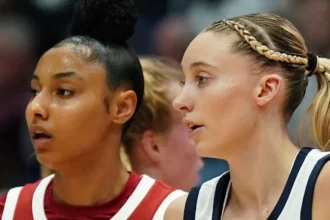Angel Reese and the Chicago Sky have had a disappointing start to their WNBA season, and after their latest defeat against the New York Liberty, questions are beginning to surface about the direction of a team that entered the year with postseason hopes.
In a conversation with the Chicago Sun-Times, Sky general manager Jeff Pagliocca addressed the team’s struggles and offered candid thoughts on how Reese can play a bigger role in helping the team reach its objectives.
Chicago Sky General Manager Admits He’s ‘Disappointed’ By Start To WNBA Season
After the Sky dropped to 2-6 on the season with a loss to the New York Liberty, general manager Jeff Pagliocca acknowledged that the team needs to improve “everywhere” if it wants to be a legitimate contender. He addressed the team’s rough start, which has included multiple blowout losses—some by 20 points or more—to opponents like the Indiana Fever.

“It’s a long season and there’s a lot of games left, but this is unexpected, and I’ve been very disappointed,” Pagliocca told the Chicago Sun-Times. “We had pretty big, significant expectations for this season. That’s why I made the moves I made,” he added, referencing offseason acquisitions such as veterans Courtney Vandersloot and Kia Nurse.
Pagliocca Opens Up About Angel Reese And Her Shooting
Pagliocca also addressed the performance of Angel Reese, 23, who has faced criticism this season for her shooting struggles—currently hitting just 36% on shots inside the arc.
Reese, who wrapped up her rookie campaign as the league’s top rebounder while averaging a double-double, has taken on an expanded role this season, spending more time on the perimeter rather than operating primarily in the paint. That adjustment has presented challenges for both Reese and the team.
“That’s something that has yet to come together, but it’s a necessity for us to win,” Pagliocca said. “She’s had some great games, and she’s had others, like everyone, where she hasn’t been at her best. But she gives us the most versatility on this roster. We need more production from her—but also for her to contribute in other ways.”







